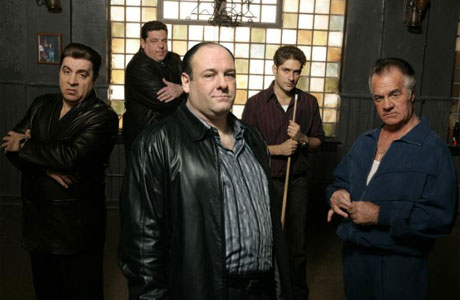How does the Mafia regard homosexuality?
Why do so many members of this hyperpatriarchal secretive society feel so threatened by gender trangressions?
Why do they need to prove their masculinity at every turn?
| Finook | ||
|
Derived from “finocchio” or fennel, a derogatory term for homosexual or gay, i.e., people that wiseguys feel nervous around.
Can also be spelled Fanook. Mario is a fudge packing finook.
Vito Spatafore, played by Joe Gannascoli, on the Sopranos is called a finook by the rest of the mob. Source: The Urban Dictionary |
||
Few observers of the American cultural scene can match George De Stefano for illuminating wit and solid scholarship. An author, journalist and critic whose work has appeared in magazines, newspapers, journals, and websites, his An Offer We Can’t Refuse: The Mafia in the Mind of America (Faber and Faber, 2006) has already become a classic. The volume explores some of his longstanding preoccupations: cultural myths and their social impact; ethnic identity and stereotypes; popular culture, especially film, and how such social categories as race, class, sexuality and gender interact in American society.
It’s no surprise, therefore, that his essay on the famous HBO show “The Sopranos” should offer a vintage crop of memorable insights into the riddles and contradictions that define the Italian-American subculture and that notorious subset of that group, the Italian mob. De Stefano—an Italian American himself—has always enjoyed gangster movies and TV shows, as well as novels such as “The Godfather”, but he has always wondered why these images of Italian Americans — as hoodlums or similarly, as boorish, uneducated proles — were virtually the only images in popular culture of people of his background.
What do the better entries in the mob genre — the “Godfather” films, “Goodfellas” and “The Sopranos” have to say about American society, not just Italians? And why are so many people so fascinated with Italian and Italian American organized crime stories? These and more questions De Stefano set out to answer. This is what he found.
___________________
A Finook in the Crew:
Vito Spatafore, The Sopranos, and the Queering of the Mafia Genre
By George De Stefano
[Visit George’s site for more details about this topic and his other books and articles.]
Whatever else can be said about ―The Sopranos – and this conference1 proves there‘s quite a lot to be said — the show was a deconstructionist‘s delight.
Throughout its eight-year run, the HBO series scrutinized categories such as ―The Mafia,‖ ―the gangster,‖ ―Italian American,‖ and ―American‖ and reconceived them, demythicizing conventional wisdom and forcing us to look at them anew.
The Sopranos‖ also critically probed the details and nuances of gender and sexuality. More specifically, it interrogated the meanings of masculinity and femininity as lived within the culture of Italian American organized crime, relocated from urban Little Italies to the affluent suburbs of New Jersey.
The show situated that inquiry within the larger context of post-industrial America, a new world shaped by developments negative and unsettling – rampant economic insecurity, widening income disparities, the resurgence of such atavisms as fundamentalist religion and Social Darwinism – and also positive and liberatory, such as diminished overt racism and greater cultural diversity, increasing gender equality and acceptance of stigmatized social minorities such as gays and lesbians.
This is Tony Soprano‘s world, but he doesn‘t feel at home in it. The suburban capo is tormented by a sense of purposelessness and confusion over his place in an America that has radically changed since the days of his gangster father, Johnny Soprano.
Things are trending downward, he complains during his first psychotherapy session with Dr. Jennifer Melfi. He is particularly troubled by the phenomenon that Italian journalist Vittorio Zucconi has called “il declino del padrino”2— literally, the decline of the godfather. Organized crime just isn‘t what it used to be, its practitioners having forsaken the discipline and values that permitted the mafia to flourish.
For Tony the decadence of today‘s mafia is emblematic of a larger decline, that of America itself, and he articulates his sense of loss in distinctly gendered terms.
Whatever happened to Gary Cooper, the strong silent type?‖ he fumes. ―That was an American. He wasn’t in touch with his feelings. He just did what he had to do. See, what they didn’t know is that once they got Gary Cooper in touch with his feelings they couldn’t get him to shut up. It’s dysfunction this, dysfunction that, dysfunction vaffancul’.
___________________
Continue reading: A FINOOK IN THE CREW
___________________
_______________________________________________________________________________
¶
ADVERT PRO NOBIS
IF YOU CAN’T SEND A DONATION, NO MATTER HOW SMALL, AND YOU THINK THIS PUBLICATION IS WORTH SUPPORTING, AT LEAST HELP THE GREANVILLE POST EXPAND ITS INFLUENCE BY MENTIONING IT TO YOUR FRIENDS VIA TWEET OR OTHER SOCIAL NETWORKS! We are in a battle of communications with entrenched enemies that won’t stop until this world is destroyed and our remaining democratic rights stamped out. Only mass education and mobilization can stop this process.
It’s really up to you. Do your part while you can. •••
Donating? Use PayPal via the button below.
THANK YOU.
____________________________________________________________________________________________________




